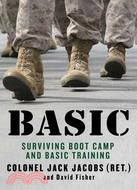商品簡介
From a Medal of Honor winner—the first book that provides a documented and oral history of an American institution: basic training
Every soldier, sailor, marine and air force personnel has one thing in common: They all have been through basic training. None will ever forget it. During the eight weeks of training each recruit learns things about themselves that they never experienced before. They are taught everything from combat
skills to making a bed with sheets so tight a quarter will bounce off them. The goal of this training is to turn a young American into a soldier, sailor or marine who will instantly and unquestioningly respond to an order.
Basic tells the history of basic training, including historic materials like schedules, menus, cadence calls, chants and songs from the various wars, and even excerpts from training manuals. This is a book that will bring back memories of basic for the 40 million people who have gone through it, and offers outsiders a look inside this life-changing experience.
作者簡介
In addition to his Medal of Honor, Colonel Jack Jacobs (Ret.) is the recipient of three Bronze Stars and two Silver Stars. He is the Vice Chairman of the Congressional Medal of Honor Foundation, holds the McDermott Chair of Humanities and Public Affairs at the United States Military Academy at West Point, and is an on-air analyst for NBC News. Colonel Jacobs is also the author of the Colby Award-winning memoirIf Not Now, When? He lives in New Jersey.
David Fisher is the author of more than fifty books, including sixteen New York Timesbestsellers. He lives in New York.
名人/編輯推薦
Praise for If Not Now, When?
“It’s a privilege to call [Col. Jack Jacobs] a friend and an honor to recommend this remarkable life story.”--TOM BROKAW
“One warning: the book you are about to read, at its core, is a story about selflessness, sacrifice and service. I will never view my friend Jack in the same way again. I just didn’t think it was possible to admire him any more than I already did.”
--BRIAN WILLIAMS
書摘/試閱
If It Moves, Salute It: Welcome to Initial Military Training
You're in the army now, you're not behind a plow;
You'll never get rich, by digging a ditch
You're in the army now.
-traditional army marching chant
Congress judging it of the greatest importance to prescribe some invariable rules for the order and discipline of the troops, especially for the purpose of introducing an uniformity in their formation and maneuvers, and in the service of the camp: ORDERED, That the following regulations be observed by all the troops of the United States, and that all general and other officers cause the same to be executed with all possible exactness.
-In Congress, 29 March 1779, By Order, John Jay, President (the beginning of basic military training)
"I am Gunnery Sergeant Hartman, your senior drill instructor. From now on you will only speak when being spoken to. The first and last words out of your sewers will be, sir! Do you maggots understand that?"
"Sir, yes Sir!"
"Bullshit. Sign off like you got a pair."
"Sir! Yes Sir!"
"If you ladies leave my island, if you survive recruit training, you will be a weapon. You will be a minister of death praying for war. But until that day you are pubes. You are the lowest forms of life on earth. You're not even human fucking beings. You're nothing but unorganized grab ass of amphibian shit. Because I am hard you will not like me but the more you hate me the more you will learn."
-from the movie Full Metal Jacket
THERE IS NOTHING AT all that compares to basic training. It's a period of several weeks during which civilians are transformed into soldiers, sailors, Marines, and airmen. There is no way to prepare for it. Those men and women who have been through basic will never forget it, and those people who haven't experienced it can't imagine it.
It's serious business, as Joseph Salerno learned on his first day at Camp Wheeler in 1943. "Right from the start they told us the theme was simple, 'You either learn to kill or you're going to be killed.'" Former Marine commandant David M. Shoup once accurately summed up the job of training depots, which, he said, were supposed to "receive, degrade, sanitise, immunise, clothe, equip, train, pain, scold, mould, sand, and polish."
As Brian Dennehy (Marines, Parris Island, 1969) explains, "Boot camp provides basic military training, but the real point is to indoctrinate you into a new way of looking at the world. The Marine Corps has a tradition of a very tough boot camp process. They are exposing you for the first time to the basic military philosophy-what otherwise might be presumed to be very risky activities. During this time officers and NCOs will tell you to do things to which your normal reaction would be, Hell no, I am not doing that.
"The basic objective of military training is to teach you how to operate as a unit, to become primarily concerned with unit cohesiveness and protection and to respond automatically to a situation that will achieve some goal. Boot camp is an assault on your individuality.
"The first few days at Parris Island is a deliberate assault on your citizen sensibility. You don't get to change your clothes, you don't get to stay clean, you don't get to shower. Any obvious signs of individuality are immediately stepped on. It's noisy, it's loud, and there is always someone in your face with some type of verbal assault. Everything you do is wrong and has to be punished, you're in a state of confusion and you're always tired. All of this forces you to respond as quickly as possible to these chaotic commands without thinking. This is a way of finding those people who are going to have trouble getting with the program. 'Getting with the program' is an important phrase, but once you get into this system of noise and confusion it all begins to make sense. And after three or four days of this the real training begins.
"I remember telling a lot of kids when we were in the barracks at night, 'Hundreds of thousands of guys have gone through this. There's no reason why you wouldn't make it.' Most of them did, too. The one thing everybody learns in boot camp is how much you can take. For most people, that usually turns out to be a lot more than they believed."
* * *
The history of basic military training is incomplete and erratic. Generally though, the introduction of organized military training is credited to Chinese general Sun Tze, the author of The Art of War, at about 500 B.C. According to legend, King Helu of Wu hired Sun Tze to teach the approximately 180 women living in his palace close order drill and the proper use of the dagger-axe. Sun Tze appointed unit leaders, and when the troops failed to follow his orders those unit leaders were beheaded-thereby setting the standard for drill instructors that any recruit can easily identify with.
The concept of drilling soldiers, teaching them how to march and maneuver in formation, dates back to the Roman Empire, when Roman generals discovered that the infantry moved more efficiently when everyone was in step. The object of training was to teach soldiers how to maneuver in step. The Romans even defined the length of one step and marched to the beat of a drum.
Basic training began unofficially in the United States in Valley Forge, Pennsylvania in February 1778 when General George Washington brought in Prussian officer Baron Friedrich von Steuben to instill discipline in his unorganized, rag-tag Continental Army. Von Steuben trained a company of 120 men in basic military conduct and drilling. Because he spoke no English, he recruited an aide to curse at the troops for him. Troops were instructed to march at a seventy-six-step per minute cadence, rather than the current 120 steps. In battle at that time, troops maneuvered as a single unit, and the army best able to coordinate its moves gained a significant advantage.
When von Steuben's original model company was trained to his standards he dispersed them throughout the Continental Army to train other troops. He then wrote down his lessons in the "Regulations for the Order and Discipline of the Troops of the United States," which has become known as The Soldier's Blue Book. As he wrote in chapter five: Of the Instruction of Recruits, "The commanding officer of each company is charged with the instruction of his recruits; and as that is a service that requires not only experience, but a patience and temper not met with in every officer, he is to make choice of an officer, sergeant, and one or two corporals of his company who ... are to attend particularly to that business.
"The recruits must be taken singly, and first taught to put on their accoutrements and carry themselves properly."
主題書展
更多書展本週66折
您曾經瀏覽過的商品
購物須知
外文書商品之書封,為出版社提供之樣本。實際出貨商品,以出版社所提供之現有版本為主。部份書籍,因出版社供應狀況特殊,匯率將依實際狀況做調整。
無庫存之商品,在您完成訂單程序之後,將以空運的方式為你下單調貨。為了縮短等待的時間,建議您將外文書與其他商品分開下單,以獲得最快的取貨速度,平均調貨時間為1~2個月。
為了保護您的權益,「三民網路書店」提供會員七日商品鑑賞期(收到商品為起始日)。
若要辦理退貨,請在商品鑑賞期內寄回,且商品必須是全新狀態與完整包裝(商品、附件、發票、隨貨贈品等)否則恕不接受退貨。























